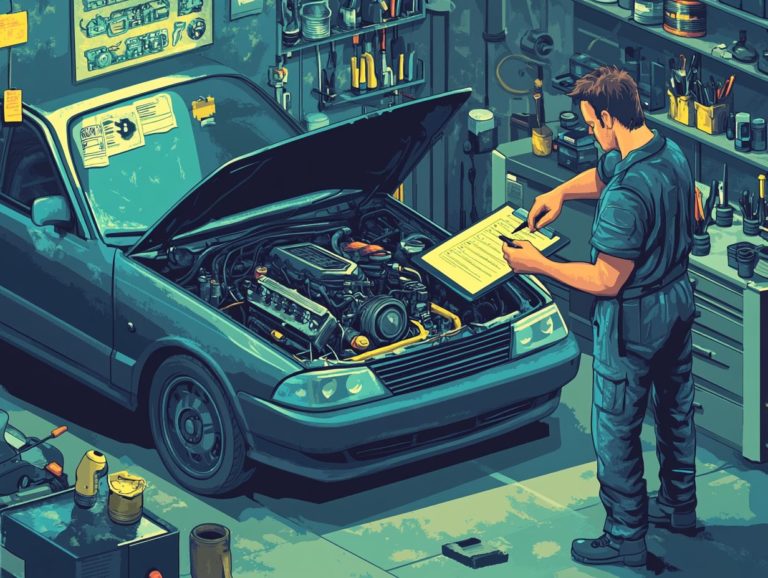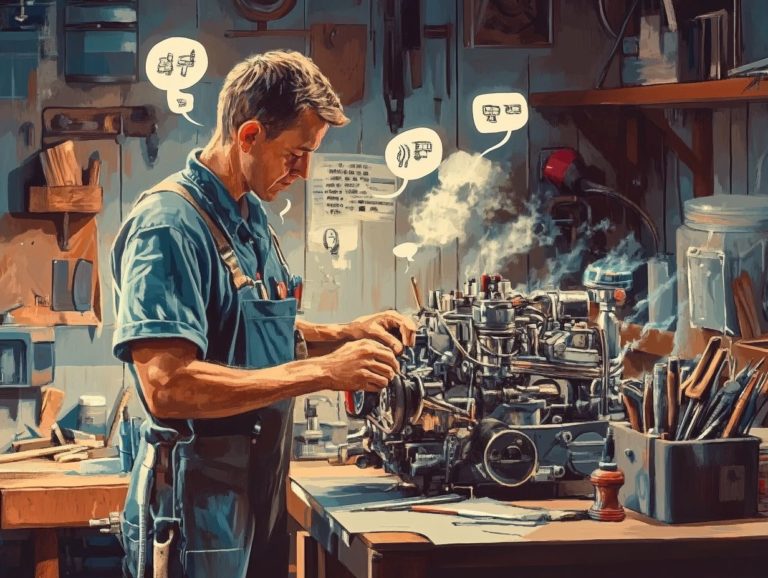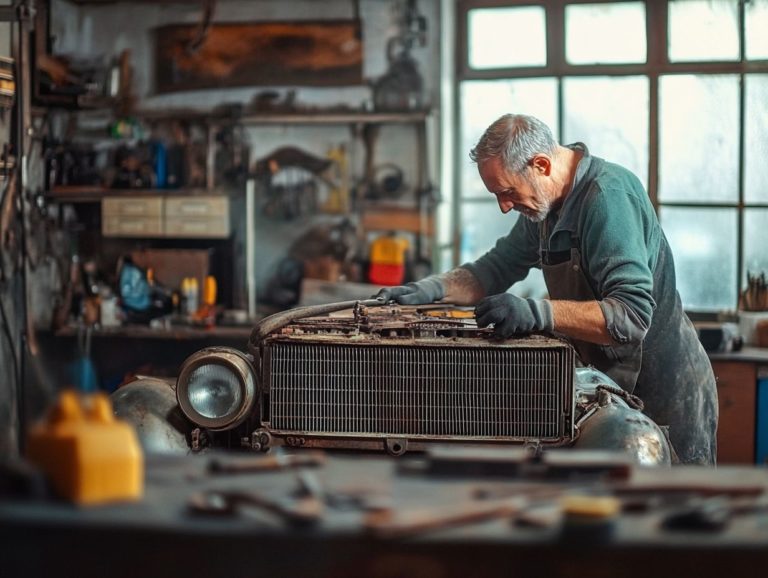5 Tips for DIY Common Car Repairs
Taking care of your car doesn t have to mean a visit to the mechanic every time something goes wrong. You ll be amazed at how easy it is to handle many repairs on your own! With a bit of knowledge and the right tools, you can tackle many common repairs right in your own garage.
This article offers five essential tips for DIY car repairs, guiding you through everything from understanding your vehicle s manual to investing in quality tools and prioritizing safety measures. Are you ready to save money and gain hands-on skills today? Let s dive in!
Contents
- Key Takeaways:
- 1. Know Your Car’s Manual and Maintenance Schedule
- 2. Invest in Quality Tools
- 3. Practice Safety Measures
- 4. Start with Simple Repairs
- 5. Do Your Research and Ask for Help
- What Are the Most Common Car Repairs That Can Be Done at Home?
- Frequently Asked Questions
- What are the top 5 tips for DIY common car repairs?
- Can I use household tools for DIY car repairs?
- What are some common mistakes to avoid when attempting DIY car repairs?
- Do I need prior mechanical knowledge to attempt DIY car repairs?
- Is it safe to attempt DIY car repairs?
- What are some benefits of DIY car repairs?
Key Takeaways:
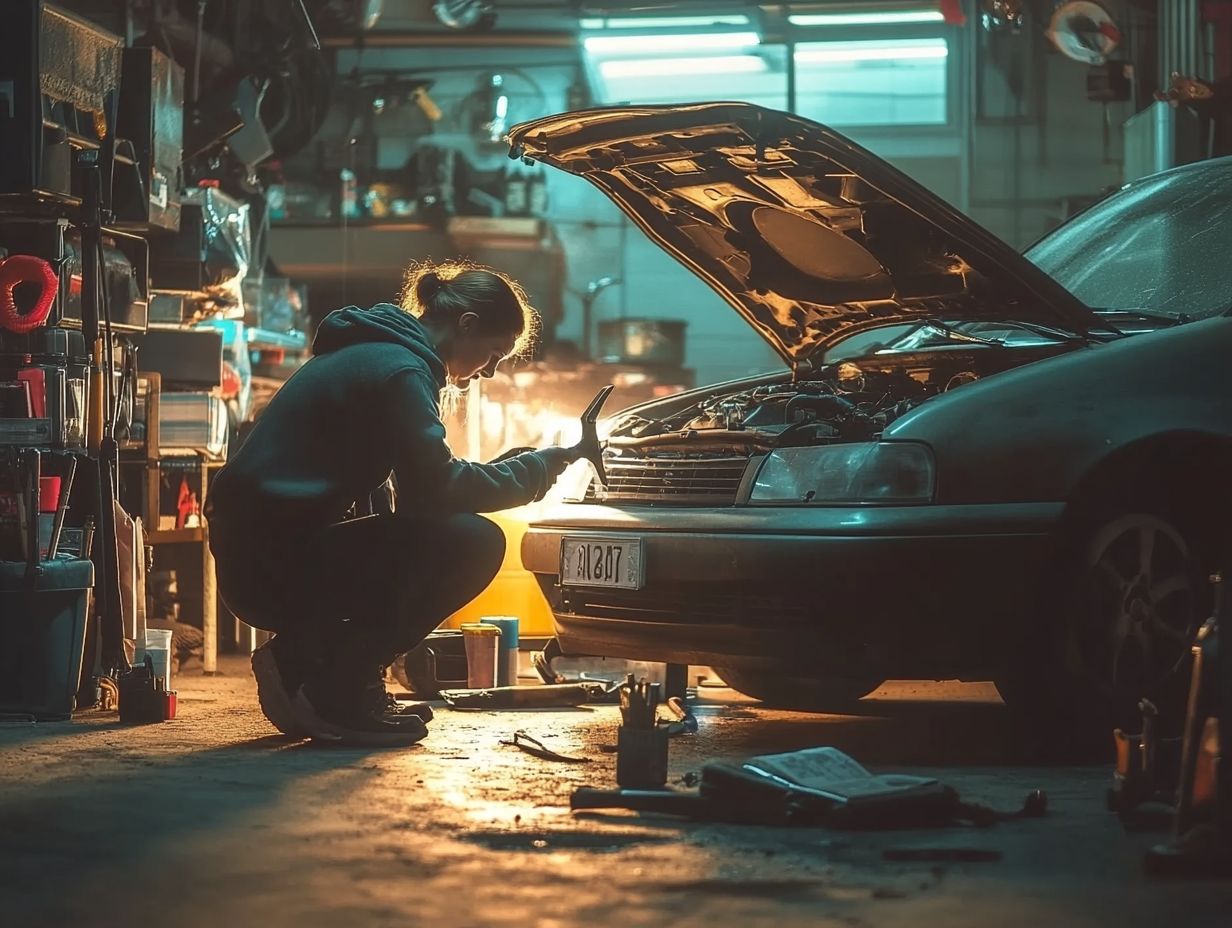
- Refer to your car’s manual to stay on top of maintenance and avoid costly repairs.
- Invest in good quality tools to save time and money on DIY car repairs.
- Practice safety measures, like wearing protective gear, to prevent accidents while working on your car.
1. Know Your Car’s Manual and Maintenance Schedule
Understanding your car’s manual and maintenance schedule is essential for ensuring its longevity and optimal performance. This manual provides vital guidelines for important maintenance tasks, such as oil changes, keeping the battery charged, and coolant checks, all of which directly affect your vehicle’s health and repair costs.
Regularly consult the manual to remind you of essential tasks such as checking fluid levels and inspecting brake pads. Replacing air filters should also be carried out at specified intervals. For example, neglecting brake pad inspections could lead to significant damage, soaring repair costs, and a serious compromise to your safety.
By adhering to these guidelines, you will maximize engine performance and enable early detection of potential issues. This proactive approach can help prevent costly repairs in the future.
Ultimately, by cultivating a habit of referring to the manual, you can ensure your vehicle remains reliable and cost-effective for years to come.
2. Invest in Quality Tools
Investing in quality tools is a savvy move for any car owner looking to tackle DIY repairs and maintenance. With the right tools, you can save both time and money while achieving effective results for tasks like oil changes, tire rotations, and brake pad replacements.
When it comes to essential automotive tools, prioritize:
- Wrenches – tools used to turn bolts.
- Jack stands – for safety and stability when working under the vehicle.
- Tire inflators – to keep your tires properly inflated.
Wrenches are crucial for loosening and tightening bolts, while jack stands grant you peace of mind when working under the vehicle. Tire inflators boost fuel efficiency and enhance overall safety. Regular maintenance with lubricants like WD-40 can prevent rust and extend the lifespan of your tools.
By investing in high-quality products, you can avoid frequent replacements and costly repairs, ultimately leading to substantial savings over time.
3. Practice Safety Measures
Practicing safety measures is essential when you’re tackling DIY repairs on your car. Not only does it safeguard your well-being, but it also contributes to the overall health of your vehicle by preventing accidents during tasks like brake pad replacements or tire inspections.
To create a secure environment, wear protective gear such as gloves, goggles, and sturdy footwear. These items are your first line of defense against potential injuries from sharp tools or hazardous materials. Ensure adequate ventilation in your workspace; it helps disperse harmful fumes and maintains air quality, especially when working with chemicals.
Regular safety assessments should include comprehensive checks of the brake systems and tire conditions, as these components are vital for safe driving. Appreciating the safety features in modern vehicles can significantly enhance your protection, allowing you to respond effectively to unexpected situations.
4. Start with Simple Repairs
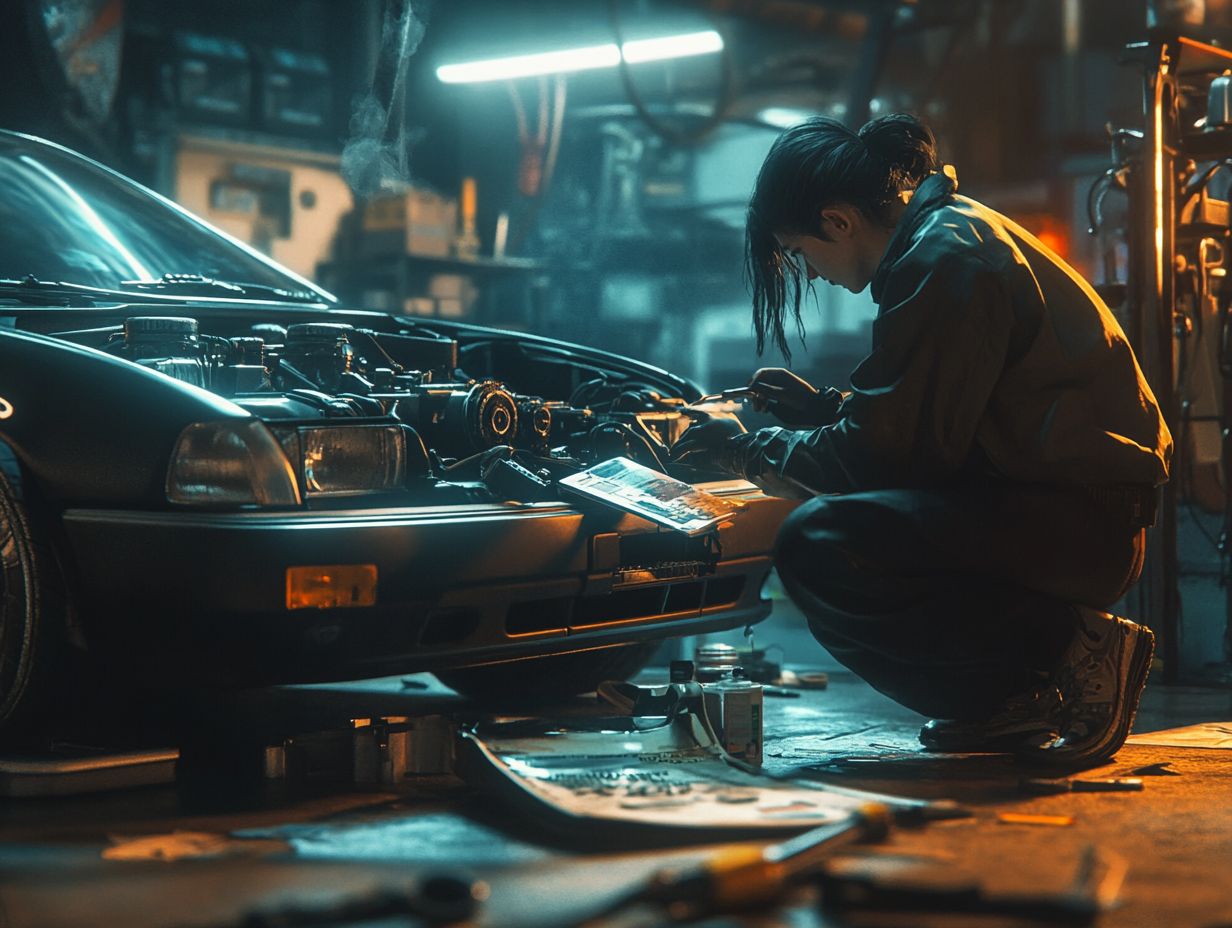
Start with simple repairs to build your confidence and skills in DIY automotive tasks. For instance, changing a cabin air filter or replacing spark plugs only requires a few basic tools and gives you an immediate sense of achievement. Familiarizing yourself with the top 10 most common car repairs can also be beneficial.
These tasks deepen your understanding of automotive systems. They fit into your routine maintenance schedule easily.
Regularly rotating your tires extends their lifespan and improves handling. Simple instructions are available to help you.
Start small and gradually take on more complex repairs. For instance, learning how to handle common winter car repairs can reward you with a fulfilling journey into DIY automotive care.
5. Do Your Research and Ask for Help
Conducting thorough research and seeking assistance can significantly elevate your prowess in DIY car repairs. You’ll gain a deeper understanding of essential maintenance tips, including 5 tips for maintaining older vehicles, such as proper battery care and the cost implications of various repair tasks.
Engage with online forums, watch instructional videos, and consult reputable automotive websites. You can gather invaluable insights that simplify even the most complex repair processes.
Connecting with seasoned friends or local mechanics allows you to access practical wisdom that may not be readily found in written resources.
This collaborative approach cultivates a sense of community and bridges the gap between theoretical knowledge and hands-on experience.
Investing time in research prevents costly mistakes and ensures repairs are done correctly. This keeps your vehicle running smoothly for years.
What Are the Most Common Car Repairs That Can Be Done at Home?
You can easily tackle many common car repairs at home! With the right tools and knowledge, tasks like oil changes, tire rotations, brake pad replacements, and coolant checks not only promote the health of your vehicle but also enable you to save on repair costs. For more information, check out DIY car repairs: what you can fix yourself.
These repairs can significantly extend your vehicle s lifespan, ensuring it runs efficiently and safely. For instance, an oil change keeps your engine lubricated, enhancing overall performance.
Tire rotation maintains even tread wear, which is essential for better handling and fuel efficiency. Changing brake pads is crucial for effective stopping power, directly impacting your safety on the road.
You ll typically need tools like wrenches, sockets, and jacks for these tasks. It s wise to consult your maintenance schedule to perform these repairs at the right intervals, further optimizing your vehicle s performance and reliability.
What Are the Tools Needed for DIY Car Repairs?
Having the right tools is crucial for your DIY car repairs; they not only streamline the process but also elevate the quality and safety of your maintenance tasks.
With a well-equipped garage, you can confidently tackle everything from simple oil changes to more complex brake replacements. Essential tools, like a dependable socket set, a torque wrench, and an impact driver, make accessing those tricky spots a breeze while ensuring that all fasteners are tightened to the proper specifications.
A torque wrench ensures you tighten bolts to the correct specifications. An impact driver helps remove stubborn screws and bolts.
Investing in high-quality diagnostic equipment allows you to pinpoint problems swiftly and efficiently. Plus, regular maintenance of your tools think cleaning and proper storage extends their lifespan and effectiveness, ensuring that each repair you undertake is executed to the highest standards.
How Can One Stay Safe While Doing DIY Car Repairs?
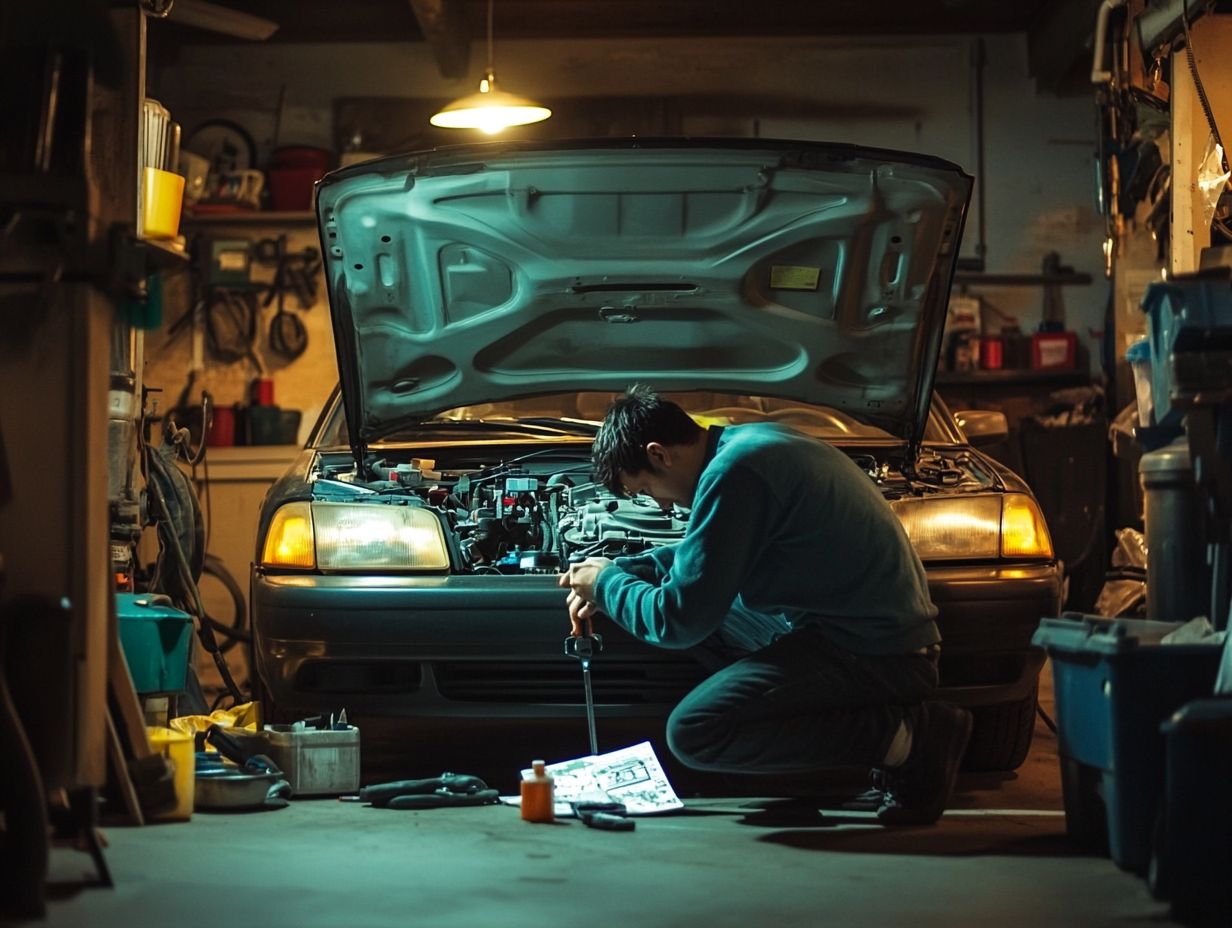
Staying safe while you tackle DIY car maintenance is essential. Good safety practices protect you from injuries and help your car last longer.
To create a secure working environment, it s vital to wear the right protective gear gloves, goggles, and sturdy shoes are a must! These items act as your first line of defense against various hazards.
Ensure adequate ventilation in your workspace. This significantly lowers the risk of harmful fumes building up, especially when handling chemicals or fluids.
Regularly inspecting your vehicle for hazards like leaks or worn-out parts can prevent accidents and save you from costly repairs. As you dive into those repairs, checking and maintaining safety features such as brakes and lights is crucial. Keeping these systems in good shape ensures your safety and the safety of others on the road.
What Are Some Tips for Successfully Completing DIY Car Repairs?
Successfully completing DIY car repairs requires preparation, knowledge, and careful execution. To enhance your readiness, learn how to stay prepared for common car repairs by thoroughly planning your approach, checking fluid levels, and consulting maintenance guides to ensure a smooth repair process.
Gather all the necessary tools and parts ahead of time to minimize interruptions. As you dive into the repair, be patient and methodical to avoid costly mistakes caused by haste.
Writing down each step helps you remember future fixes and improves your skills. After completing the work, conduct a follow-up inspection. This ensures everything is functioning correctly and helps you spot any overlooked issues.
This cycle of preparation, execution, and review paves the way for long-term success in car maintenance and repair.
When Should One Seek Professional Help for Car Repairs?
While many car repairs can be done at home, it s crucial to know when to call in the professionals especially for complex repairs that require expert skills or specific know-how. This keeps you safe and helps you stick to your car’s maintenance schedule.
For example, if you encounter engine issues like overheating or strange noises, these could signal deeper mechanical problems that need an expert s insight. Transmission issues often show up as difficult shifting gears or slipping, which typically requires advanced diagnostic tools and seasoned expertise for effective resolution.
Electrical system failures can be particularly tricky. They involve intricate wiring or complex components that, if mishandled, could lead to even more significant complications or hazards. Regularly consulting your maintenance schedule helps you identify those key milestones when professional help is not just advisable but necessary for safe and reliable vehicle operation.
What Are Some Common Mistakes to Avoid When Doing DIY Car Repairs?
Avoiding common mistakes during DIY car repairs is essential for both the effectiveness of your work and your safety. To help you navigate potential pitfalls, consider learning how to manage common car repairs on a budget. Oversights can lead to unnecessary expenses and potentially dangerous situations, so it pays to be cautious.
Stay alert to avoid skipping important safety steps or making costly mistakes. It s crucial to recognize the importance of using the right tools suited for the task; improper equipment can derail your repair efforts and jeopardize your personal safety.
A thorough approach should include regular maintenance checks and a habit of double-checking each step before concluding your work. This practice reinforces the value of meticulous attention to detail throughout the entire repair process.
Frequently Asked Questions
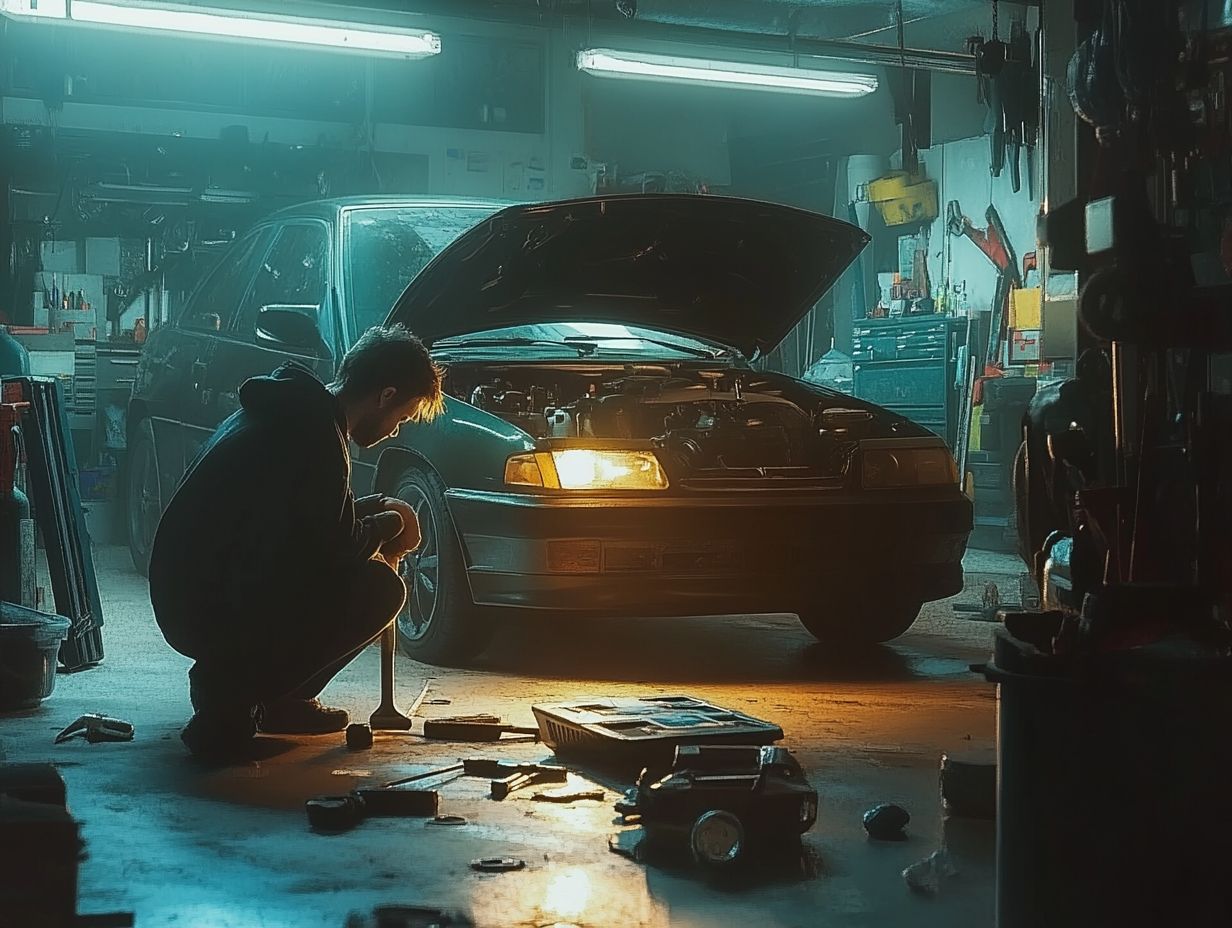
What are the top 5 tips for DIY common car repairs?
1. Have the right tools before starting any repairs. Basic tools like wrenches, pliers, and screwdrivers are essential. You may also need special tools for specific tasks.
2. Learn about the specific repair you need. You can find tutorials and step-by-step guides online or in repair manuals. This knowledge helps you understand the process and the challenges.
3. Always take safety precautions. Wear protective gear and unplug the battery before working on electrical parts.
4. Take your time with each repair. Patience is key to ensuring that everything is done correctly.
5. If you feel unsure about a repair, seek professional help. Trying to fix something beyond your skill can lead to bigger problems.
Can I use household tools for DIY car repairs?
Some household tools can work for basic repairs. However, it’s wise to invest in quality automotive tools for more complex jobs. These tools are specifically made for car work and ensure better results.
What are some common mistakes to avoid when attempting DIY car repairs?
Avoid not tightening bolts and screws properly. Using the wrong parts or fluids is another common error. Always diagnose the issue before starting any repair. Double-check your work and follow instructions closely.
Do I need prior mechanical knowledge to attempt DIY car repairs?
Having some mechanical knowledge can be helpful but isn’t required for all repairs. With online tutorials and guides, anyone can learn to do basic car repairs. Just be cautious and ask for help if you’re uncertain.
Is it safe to attempt DIY car repairs?
DIY car repairs can be safe if you follow proper safety measures and take your time. For those looking to tackle brake maintenance, consider these 7 tips for DIY brake maintenance. Know your limits; if you feel uncomfortable, it’s best to leave the job to a trained mechanic. Complex or dangerous repairs should always be handled by professionals.
What are some benefits of DIY car repairs?
You can save money on labor costs and feel a sense of accomplishment. Learning about car repairs helps you understand your vehicle better and catch issues before they escalate.

